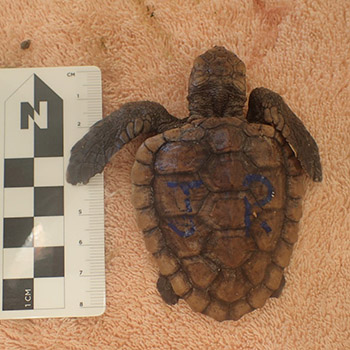Grant: 21-004R
Project Title: Health impact of near-ubiquitous plastic ingestion in Florida's young turtles
Project Manager: David Duffy
Organization: University of Florida - Whitney Laboratory (Research and Educational Institute)
Grant Amount: $26,355.00
Completion Date: 2022-12-01
Summary: This project will investigate the incidence and health effects of the largescale plastic ingestion seen in post-hatchling and juvenile sea turtles. We have recently shown that 96% of post-hatchling sea turtles stranded in north Florida have ingested plastic marine debris. This is particularly concerning as young hatchling and post-hatchling sea turtles are at the most vulnerable life-stage. Having identified the scale of the problem, we now seek funding to assess the detrimental health effects of plastic ingestion on marine turtles. Plastic ingestion can likely produce a range of negative health consequences which we will assess, including: gastrointestinal tract rupture; inflammation; ulceration; blockage; compaction; nanoplastic and leeched chemicals entering the blood stream and internal organs. Our quantitative plastic ingestion assessment, ingested plastic origin classification and health assessments will be crucial to informing management and public outreach and awareness activities, and to drive changes in management, consumption, manufacturing, and waste disposal/recycling practices. The improved understanding of the prevalence and consequences of plastic ingestion in Florida's turtle species generated by this project will help raise awareness, and the design and implementation of effective longer-term preventative management strategies. Results: All experimental work associated with the project has been successfully completed. Ingested particles were analyzed by differential scanning calorimetry, Fourier Transform Infrared (FTIR) Spectroscopy and pycnometry to assess their thermophysical properties and to characterize any features that are indicative of more commonly found polymers likely to be found in the broader environment. Of the particles tested, nearly all were polyolefins such as polyethylene (PE) and polypropylene (PP). Density assessments of these particles reinforced the identifications by FTIR and DSC. The density results have the potential to be misleading given that the presence of additives and fillers could raise the particle density relative to the density of the neat polymers before any exposure in the environment. These measurements help paint a larger picture of how these floating plastic particles can be threats to sea turtle hatchlings who consume them. Our plastic type analysis results have successfully been published (open access) in the journal Microplastics (Beigzadeh et al. 2022), https://www.mdpi.com/2673-8929/1/2/18.
Results: All experimental work associated with the project has been successfully completed. Ingested particles were analyzed by differential scanning calorimetry, Fourier Transform Infrared (FTIR) Spectroscopy and pycnometry to assess their thermophysical properties and to characterize any features that are indicative of more commonly found polymers likely to be found in the broader environment. Of the particles tested, nearly all were polyolefins such as polyethylene (PE) and polypropylene (PP). Density assessments of these particles reinforced the identifications by FTIR and DSC. The density results have the potential to be misleading given that the presence of additives and fillers could raise the particle density relative to the density of the neat polymers before any exposure in the environment. These measurements help paint a larger picture of how these floating plastic particles can be threats to sea turtle hatchlings who consume them. Our plastic type analysis results have successfully been published (open access) in the journal Microplastics (Beigzadeh et al. 2022), https://www.mdpi.com/2673-8929/1/2/18.